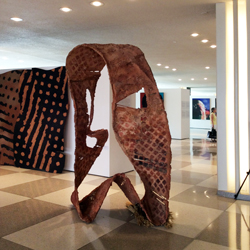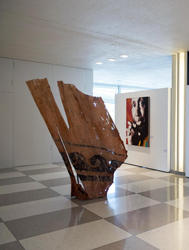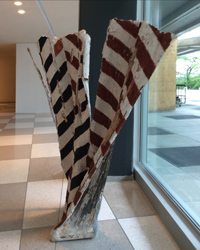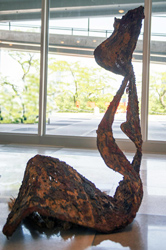![]()
|
« De Arte Fingendi Drama » abstract sculptures |
Double click on a image for info and larger images. |
|
|---|---|---|
| Abstract sculptures are main performers in Fabrizio Ruggiero's installations and are known by the Latin title that groups them: " De arte fingendi drama " | ||
|
Elusive Harmony |
Gaia‘s InterlockIng Web
|
Rising from the Ashes |
| The Latin verb fingere has many meanings as to touch, to caress, to smooth. | ||

Totem of a Vanished People |
|

Lone Survivor of a Sea Crossing |
| Among the meanings of the Latin verb fingere there are even to think, to imagine, to invent, but also to form, to mould, and then to carve, to sculpture. | ||
 |
 |
 |
| The sculpture technique suggested by Latin verb fingere is that of moulding, but in his Abstract Sculptures Fabrizio Ruggiero preferred to use fresco-roughcast plaster. | ||
| Another important element that has taken part in the construction of abstract sculptures is canniccio or cane-mats used by peasants to spread out grapes to dry. | ||
| Even if for Blaise Pascal Man is a thinking reed, in western culture cane and reeds seem to have a mainly profane function as support or shelter. | ||
| In the Far East, on the contrary, they have a sacred function. Chinowa in Shinto is a circle of canes used for purification, in China arches and cane carpets are instruments of initiation and in India Vetasa, the cane, is the " Axis Mundi " or Axis of the Universe. | ||
| Certainly the most evocative image of the symbolical meaning of cane is that proposed by Sufi Jalal Al Din Rumi: - " It is pale and its internal side is empty, it has given its head to wind and repeats ' God, God ' without words. ", because cane is also a flute and therefore a voice. | ||
Vassily Kandinsky wrote poetry on canes, it is called "Open": Now in the green grass sluggishly vanishing. Now in the grey mud hidden. Now in the white snow sluggishly vanishing. Now in the grey mud hidden. Lain down for long time: Thick long black reeds. Lain down for long time. Long black reeds. Reeds. Reeds.
|
||
|
" The transformative Power of Art" Exhibition United Nations Visitors Lobby, New York. June 2015
|
||